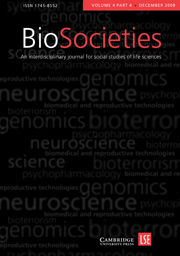Article contents
Person, Patent and Property: A Critique of the Commodification Hypothesis
Published online by Cambridge University Press: 01 September 2007
Abstract
It is a striking feature of current biomedicine that it increasingly relies on access to various types of human biological material. Social scientists often criticize the exchange systems facilitating this access for causing a process of ‘commodification’. Though it is not always clear what commodification is thought to imply, a morally degrading transformation from something intrinsically human to an object of ownership seems to be at stake in most accounts. Enrolment in capitalist exchange is typically portrayed as (actively) changing the status of the (passive) body part from being part of a dignified human whole to be a mere fungible commodity. In this article I argue that the notion of commodification is inadequate for an analysis of the dynamics at play in the establishment of exchange systems for human biological material. In particular I focus on the development of the patent regime. The point is that rather than focusing merely on what capitalist forms of exchange do to biotechnology and the body, we might begin to appreciate what biotechnology and the socio-cultural significance of the body do to capitalism and its property structures—or, more precisely, how people’s engagement with, and concern about, biotechnology contributes to the shaping of multiple capitalisms.
Information
- Type
- Articles
- Information
- Copyright
- Copyright © London School of Economics and Political Science 2007
References
- 35
- Cited by

